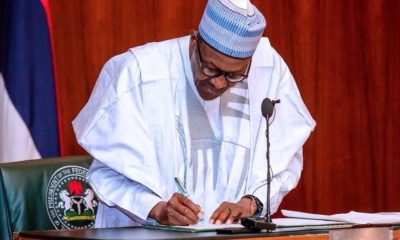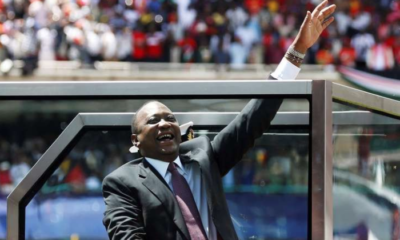Biafra
Police Find Biafra War Bombs, Rocket Launcher
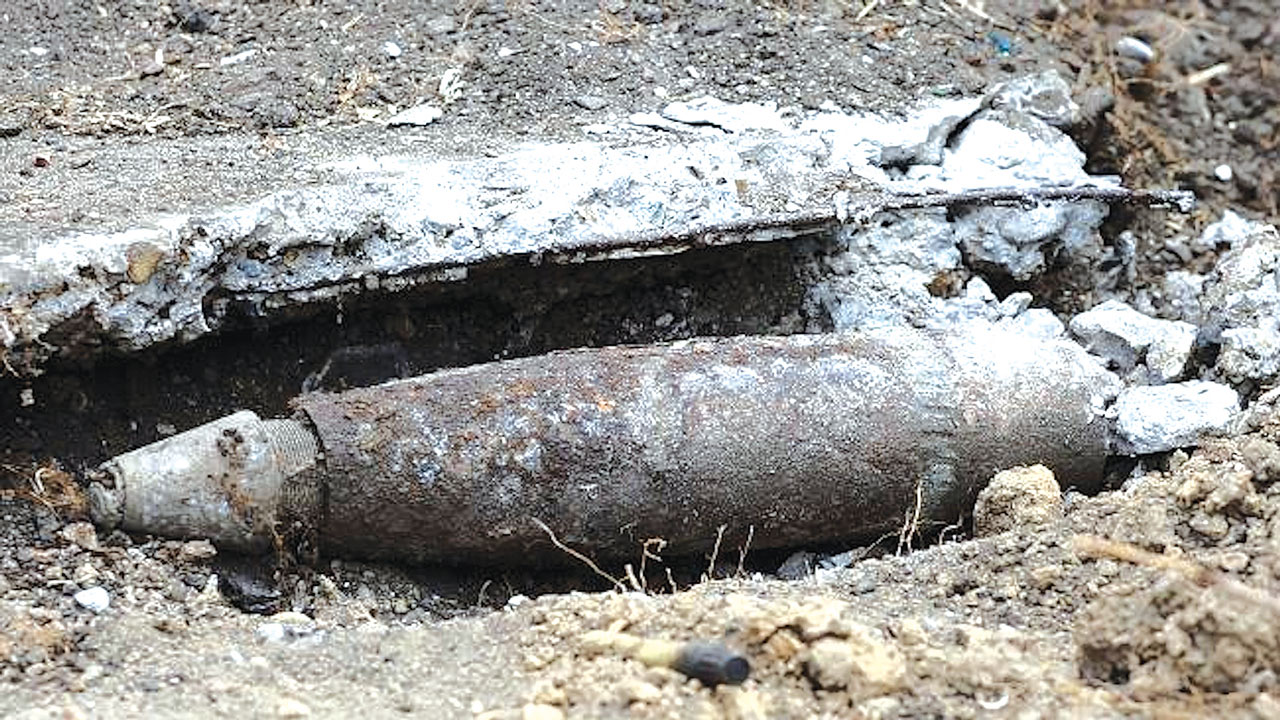
The Nigerian police in Imo on Tuesday announced the recovery of weapons abandoned during the Nigerian Civil War, 43 years after the war ended.
The explosives included wartime munitions recovered from old military trench at Okigwe and five primed improvised explosive devices found at a robbery scene at a new generation bank in Ezinihitte, Mbaise Local Government Area.
Ten live wartime military bombs were also recovered at Ogbaku in Mbaitoli Local Government Area, along with six live old wartime military bombs found at a building site at Ohuba in Ohaji/Egbema Local Government Area.
The Commissioner of Police in the state, Mr Muhammad Musa, who displayed the ammunition in Owerri, said the explosives were recovered by men of “Operation Sweep” formed to get rid of deadly explosives in the state.
He said the efforts were part of the result of continuation of onslaught on crime and criminals in the state
Other weapons recovered were four explosive devices and one rocket launcher, five electromagnetic old wartime bombs and six handheld grenades recovered from a road construction site at Orlu.
Old wartime military bombs and two exploration bullets were found in Ohaji/Egbema Local Government Area, while four primed explosive devices and one handheld grenade were recovered from an abandoned vehicle.
“We are determined to sweep and clean Imo of explosive ordnance like bombs and other improvised explosive devices and weapons buried during the Nigeria Civil War,” he said.
Musa noted that some of the bombs had been detonated, adding that apart from the five local government areas, the operation would cover the state.
According to him, some explosives were recovered from hoodlums who engaged the police in a gun battle.
The commissioner advised traditional rulers and other stakeholders to guard against the use of local canons at social gatherings as hoodlums used them during robbery operations. (NAN)
Source: PM News

IPOB
Police Arrest 34 Suspected IPOB Members Over Inspector’s Death
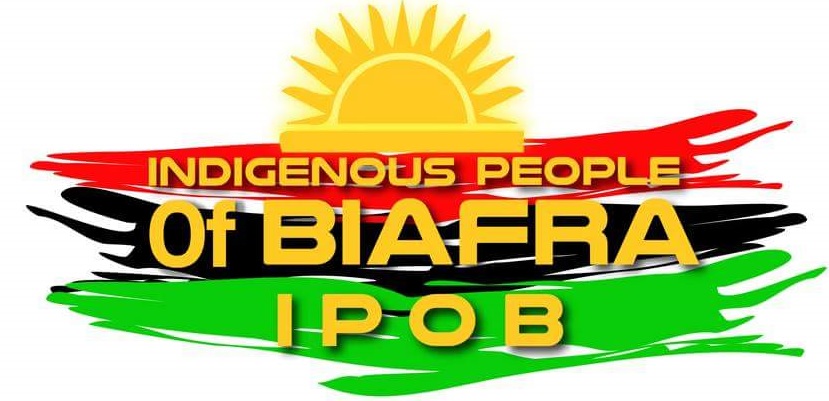
The Anambra State Police Command has arrested 34 suspected members of the proscribed Indigenous People of Biafra ( IPOB) in connection with the killing of a police inspector in Nnewi.
The spokesman of the command, SP Haruna Mohammed, made the disclosure in a statement on Saturday.
Haruna said that some personnel and a Divisional Police Officer (DPO ) were also wounded while a police patrol van was set ablaze.
The spokesman said that riot policemen of the Police Mobile Force (PMF), Counter Terrorism Unit (CTU), Federal Special Anti-Robbery Squad (FSARS), EOD and Special Anti-Cult Unit personnel and conventional policemen have been deployed in Nnewi and environs.
Haruna said that on November 23 at about 11:55 am, there was intelligence report that members of IPOB were gathering near the Teaching Hospital, Owerri Road, Nnewi with intent to cause a breach of public peace.
He said following the report, the police patrol teams led by the Area Commander, Nnewi, ACP Nnanna Ama, mobilised to the scene to disperse and prevent them from causing a breakdown of law and order.
The spokesman explained that as soon as the team arrived, the IPOB members descended on them, set ablaze one patrol vehicle and attacked them with machetes and stones.
“They marched towards the Agbaedo Market shouting “No Elections without referendum”.
“The injured personnel were rushed to the hospital for medical attention; where the Inspector was certified dead by a medical doctor while the DPO and the ASP are presently receiving treatment,”he said.
He said that the police joint team have commenced search operations for the recovery of two AK47 rifles and one Beretta pistol with ammunition snatched from the slain police inspector and police officers.
Sourced From: THISDAYLIVE
Biafra
Pension: PTAD Tackles Ex-Biafran Police Officers’ Cases
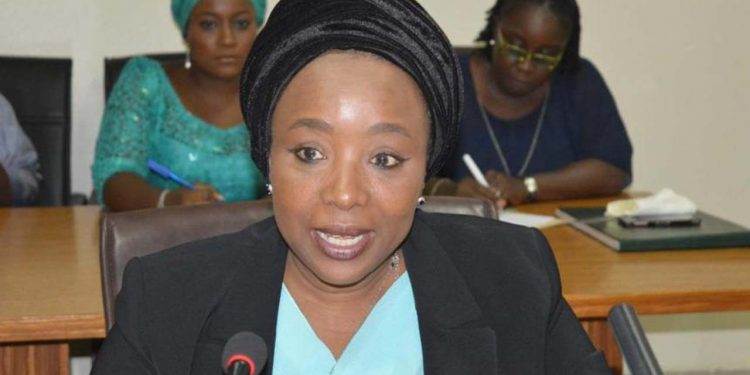
By Raphael Ede, Enugu.
The Pension Transitional Arrangement Directorate (PTAD) has said that former Biafran police officers would soon get their retirement benefits as 500 of them have been verified.
PTAD Executive Secretary, Sharon Ikeazor, disclosed this, on Wednesday, at the South East Stakeholders engagement forum. She noted that 159 of them had actually been pay-rolled as they were able to present evidence of their service to the Nigeria Police.
Ikeazor said that during the flag off of the exercise in Enugu, in 2017, 206 ex-war police officers and 67 next of kin were paid gratuity and retirement benefits amounting to N887, 652,117 between 2015 and 2018.
She said that N87,357,470.35k was paid in gratuity and pension in 2015; N662,404,800.98k was paid in pension in 2017 while N137,889,845.30k was paid in pension in 2018.
The Executive Secretary also said that the next of kins of affected police officers who died before May 29, 2000, were not qualified for benefits, explaining that it was based on the memo by the Secretary to the Government of the Federation, dated September 17, 2001 and approved by the President, which stated that “the question of payment of arrears of salaries from 16th January, 1970 to 29th May, 2000 should not arise as the conversion from dismissal to retirement was not retroactive”.
Ikeakor said that only those with the letter of amnesty issued by the Police Service Commission (PSC), pension advice and pension authority, authority for payment of pension and gratuity, computation sheet, evidence of service with the Nigeria Police Force and letter of introduction from Association of Retired War police Officers (ARWAPO), letter of administration from a high court, death certificate from a recognised government hospitals and evidence of payment received from PSC in 2006 and 2007 would be attended to.
Sourced From: The Sun Nigeria
Biafra
A Combatant’s Chronicle Of The Nigeria Biafra War
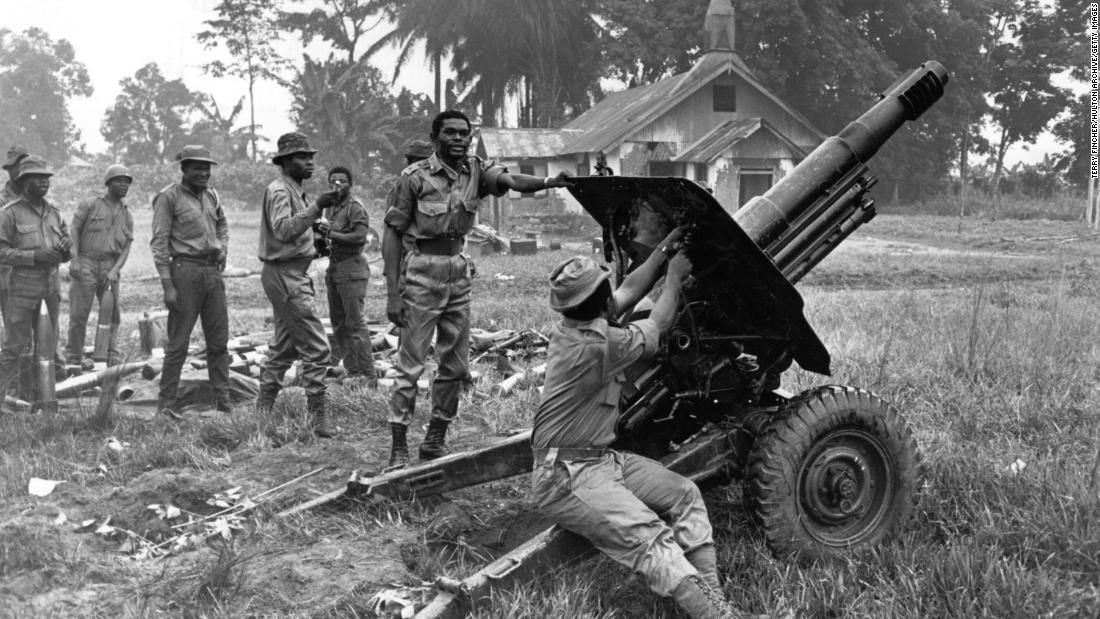
By Kunle Ajibade
It is feeting and quite thoughtful that General Godwin Alabi–Isama has chosen Nelson Mandela’s birthday to present his book, The Tragedy of Victory. For Mandela, in so many ways, exemplifies the generosity of spirit which you will constantly encounter as you read this sprawling book. In Long Walk to Freedom. Nelson Mandela’s engrossing and deeply moving chronicle of his extraordinary life, he shares the honour and glory of the successes of the anti-apartheid struggles, not only with all the comrades with whom he served long jail terms, but also with many others who supported the struggles. For instance, on page 601 of that fascinating book, Mandela pays the following tribute to one of his comrades: “In Plato’s allegory of the metals, the philosopher classifies men into groups of gold, silver and lead. Oliver Tambo was pure gold; there was gold in his intellectual brilliance, gold in his unfailing loyalty and in his tolerance and generosity, gold in his unfailing loyalty and self-sacrifice. As much as I respected him as a leader, that is how much I loved him as a man”.
Gratitude matters. Appreciation of the good contribution of others humanises us all. When you recognise the goodness of others, you’re actually laying the building blocks of what will make humankind endure and survive. It doesn’t diminish you; the world is incredibly richer for it.
The total lack of this kind of generous spirit in General Olusegun Obasanjo prompted General Alabi-Isama to write The Tragedy of Victory. Three years ago, when General Godwin Alabi – Isama turned 70, he came to Nigeria from the US to celebrate his birthday. His close friend, General Alani Akinrinade who attended the ceremony, gave him two copies of General Olusegun Obasanjo’s My Command. By that time Alabi-Isama had heard about the book but had never read it. Akinrinade had told his friend that the book would turn his belly. It surely did. General Alabi-Isama discovered that there were so many distortions of fact in the book, and he immediately dismissed it as a tapestry of inaccuracies. As he read it, he marked out not less than eighty two passages in My Command where General Obasanjo simply told outright lies to massage his ego and damage the reputation of his colleagues. Alabi-Isama then thought that since he was still a moving encyclopaedia on the 3 Marine Commando Division it was time to tear the painted mask of Obasanjo’s lies.
In My Command, the achievements of gallant officers like Benjamin Adekunle (The Black Scorpion), Alani Akinrinade, Godwin Ally, Ayo Ariyo, Ola Oni, Isaac Adaka Boro, Ahmadu Aliyu, Roland Omowa, Sani Bello, SS Tomoye, Yemi Alabi, Philemon Shande, Musa Wamba, Mac Isemede, Sunny Tuoyo, Audu Jalingo, Ignatius Obeya, and their informants like Ndidi Okereke – Onyiuke, Margaret Eyo, Florence Ita-Giwa and many other women who made the 3 Marine Commando Division such a formidable force, are tainted and belittled. Blessed with very good memory, General Alabi-Isama, in Tragedy of Victory, offers a ferocious and damning critique of General Olusegun Obasanjo’s vainglorious claims of his gallantry. He sets the mangled records straight with absolute passion, precision and indignation. To him, history matters because it is meant to inspire and instruct posterity. He shares George Santayana’s view that those who forget the past are doomed to repeat it. And because Nigerians have been made cynical by many decades of lies, all claims that Alabi-Isama makes he supports with abundant evidence. If this book is a 671-page tome it is in part because the memoirist illustrates his story with 450 pictures, 36 maps and 20 documents. It is also partly because the author meanders. He repeats himself many times.
By and large, his responses to General Obasanjo’s claims show that he was a more competent soldier, military strategist and theorist than OBJ, who tends to mistake good luck for profound gift and talent. Alabi-Isama simply did his duty and left politics in the army for all the crafty war profiteers who have been described by Wole Soyinka in Jero’s Metamorphosis as DGS – Desk Generals. As Chief of Staff of 3 Marine Commando Division, he was very demanding of everyone – he was hard on his men and women without ever losing tenderness. Deep knowledge was central to his strategy and tactics, so he sought for it everywhere. Indeed, one very important duty of the 3 Marine Commando women was collecting vast data about Biafran soldiers and their operational orders. The 3 Marine Commando Division operated in a very difficult terrain of creeks and mangrove forest comprising the present Rivers, Cross Rivers, Akwa Ibom and Bayelsa States. Those young men and women fighting for the unity of a country that would later abandon them demonstrated uncommon patriotism. Consider the courage of a young officer who just got shot in the war front, and as he was about to die he asked his commander, Alabi-Isama, who was carrying him, “Have I tried?” Those young men were brave people. Consider the immense talent and heroic move of captain Gbadamosi King, the Nigerian Air Force pilot whose air-to-air operation was the first, not only in Nigeria’s history but was the first in Africa. Consider also the exploits of those ladies who cheered up the troops when their morale was down. The book is dedicated to Alabi-Isama’s mother who solidly supported the war efforts of her only son.
This was war at the Atlantic theatre. A very difficult place to fight to keep Nigeria one. Each time situations became intractable and confounding, it was either Akinrinade or Alabi-Isama who were ordered to go and sorts things out. Many of the troops died of malaria, dysentery, cholera, cold and snake bites. One soldier was swallowed by a 50-foot-long snake. The troops had to kill the snake with the soldier still inside.
As the troops were getting tired, the Biafrans redoubled their efforts. Helped by France, they launched deadly attacks. With the capture of Port Harcourt by the 3 Marine Commando in 1968 and the capture of Enugu and Umuahia in April 1969, Biafrans had lost three of its major capitals. Uli-Ihiala then became its centre of gravity. But Colonel Benjamin Adekunle, the commanding officer, did not see Uli-Ihiala that way. Missing the point completely, he ordered that OAU (Owerri, Aba and Umuahia) be captured as an October 1 1968 as Independence gift to General Yakubu Gowon. It was a complete disaster. General Alabi-Isama says he warned his commander against the operation but Colonel Benjamin Adekunle did not listen. The 3 Marine Commando Division that had given a good account of itself in Bonny, Calabar, Warri, Ugep, Obubra, Oron, Uyo, Ikot Ekpene, Itu, Eket, Abak, Etinan, Opobo, Bori, Okrika, Port Harcourt, Degema, Buguma, Abonema, Finima, Nembe, brass, Ahoada and part of Midwest now became a butt of joke in other divisions. Other blunders followed. Suffering from stress, all those who criticised Benjamin Adekunle constructively he regarded as cowards.
The case became so bad when he decided to get both Alabi-Isama and Akinrinade killed in an ambush. They escaped to Lagos where they reported to General Gowon the crisis of confidence in the 3 Marine Commando. But Gowon was very reluctant to remove Adekunle thinking that, with the Agbekoya riots and protests in Ibadan, many people would shout, “ethnic cleansing” if a non-Yoruba officer was brought in as a commander. He therefore asked Akinrinade and Alabi-Isama to suggest a Senior Yoruba Officer he could use. Akinrinade suggested Obasanjo–not Oluleye, not Sotoye, not Olutoye because Akinrinade and his friend were simply desperate to have a commander who would listen to them and implement Alabi-Isama’s operation Pincer 2, a plan that they were sure would end the war in 30 days. Obasanjo was not an infantry officer, he was in the Army Engineers Corps, but Akinrinade rooted for him because he thought he was his friend. General Gowon, who suspected that Obasanjo would not want to go to the war front, asked Akinrinade and Alabi-Isama to go and persuade him which they did. Of course, General Gowon was right. General Obasanjo was furious that they suggested his name. He thought these men wanted him dead. While Akinrinade was civil in his dealing with him, Alabi-Isama was impatient; he told him off, wanting at a point to walk out after several hours of talking without any food or drink from their host. Alabi-Isama would soon pay the big price for doing that to Obasanjo who obviously has what the medical experts call pachydermatous memory for slights and insults.
When General Gowon gave the order that all divisional commanders at the war front, who had been there for two years, should be replaced and the then Colonel Obasanjo was made the commander of the 3 Marine Commando Division both Alabi-Isama and Akinrinade thought they had won but their victory is part of the tragedy recounted in this book. General Olusegun Obasanjo’s did not take over the 3 Marine Commando until 16 May 1969. As soon as he did, he simply sidelined Akinrinade and Alabi-Isama . He went after all the members of the dream team of the Commando with vengeance. The winning force that was being praised for fighting gallantly to keep Nigeria one was now fighting a war of attrition. George Ininh who knew how to play the politics of genuflection which Obasanjo wanted rose meteorically during and after the war.
Four days after he resumed duty, Obasanjo’s first battle experience as a commander of 3 Marine Commando Division was a disaster. In what Alabi-Isama describes as a complete disregard of the sound advice of his sector commanders he ordered Godwin Ally to attack Ohoba, a town 40 kilometres south of Owerri. The Division lost over 1,000 troops. This loss still enrages Alabi-Isama who suggests that in a saner society Obasanjo should have lost his commission on account of that tragedy. Why would he be bothered? Did the high command in Lagos ever sanction Murtala Mohammed of 2 Division for ordering an Asaba – River Niger crossing, against the advice of Akinrinade in which about 2,000 troops died by drowning and bullet wounds in the River Niger? Alabi-Isama reminds us many times that Obasanjo, the blundering Commander of 3 Marine Commando Division “had no battle experience and had never fought at any of the three fronts of the war. He had never commanded a battalion or a brigade, now he had to command a division in battle. That was why his military administration and logistics placing was that of a cadet”.
It was because of his tactical error as a commander that he was almost killed in an ambush when he visited Col. Iluyomade’s unit. He had to flee from the ambush and got shot in the bottom. Alabi-Isama’s take on that is that true generals do get shot in the chest, not bottom. Before Obasanjo was posted to 3 Marine Commando Division, Alabi-Isama, in consultation with Adekunle and other officers, had three plans – Pincer 1, 2 and 3, strategies and tactics which their division knew would win the war. Pincer 1 would be a monstrous operation that was meant to level many towns in Biafra. As if to impress those who were doubting his ability, Obasanjo wanted his troops to settle for that. If the 3 Marine Commando had used that plan, Alabi-Isama argues, the charge of genocide that Chinua Achebe raises in his book, There Was a Country would have been justified. Thankfully, reasons prevailed. The commander finally listened to his officers. Pincer 2 was used. And it took only 23 days for the 3 Marine Commando Division to put an end to the Nigeria-Biafra War. Biafra surrendered, not to Obasanjo who was not at the war front, but to Alani Akinriande who was very much there.
It was a triumphant and self-centered Obasanjo who rushed to Lagos with Effiong and some of the Biafran officers. And the real heroes of that war were then forgotten. But Alabi-Isama was not only forgotten he was later persecuted and dismissed from the army by General Olusegun Obasanjo who was then the head of state. Alabi-Isama was accused of stealing money which he did not know anything about. He was even accused of being part of the Dimka coup. The two officers who refused to implicate him suddenly died mysteriously. But as James Frederick Green would say their organised slaughter did not settle the dispute, it merely silenced an argument which The Tragedy of Victory has now brought to the front burner. Before his unjustified persecution, General Alabi-Isama was the likeable Principal General Staff Officer of the Nigerian Army. He was a well-decorated officer. He gave the Nigerian Army his best shot. And he was a role model. It is important to remember that our history is full of this kind of bad behaviour. Let me explain that with just one example. In 1980, Chief Bola Ige accepted to review My Command because he thought General Olusegun Obasanjo was a good friend. But since Ige’s assassination, has the general not been dancing on his grave?
Of course, The Tragedy of Victory is not only about the civil war and the 3 Marine Commando Division even though it is the major plank of it, its centre of gravity. There are other+ interesting stories. The story of his humble early life, how he joined the army after his secondary school at Ibadan Boys High School, his military training in Zaria and England, his peace keeping mission in the Congo where he helped to kill a huge and notorious hippopotamus that had been terrorising a village for many years. There is a sense in which the story of the Nigerian Army mock battle in Ibadan which he and his troops won foretold the victory of the Nigeria-Biafra war in the Atlantic Theatre. We are told of how he was captured by the Biafrans, how he was sent to Kirikiri prison for wrong accusation. We are moved by the story of Azuatalam the wonderful swimmer who was later recommended to be recruited into the Army by General Alani Akinrinade. The reader is told of how Alabi-Isama and his officers arrived at their strategies and tactics like the dilemma strategy. As Generals Yakubu Gowon and Adeyinka Adebayo write in their introductory remarks, this is a book about military strategies, tactics and campaigns. There is the interesting story of the visit, in 1993, of Stella Obasanjo to his American home where Stella stayed for a pleasurable week. You will not miss the story of how he saved General T.Y. Danjuma and Domkat Bali from being killed by the Dimka coupists.
Finally, it is clear from our reading of this book that when we yield our hallowed ground to clueless people, they will grow and nurture their weeds on it, thereby suffocating the flowers of the land. May our country have the good sense to always choose good people who will reproduce their goodness in others.
—Mr. Kunle Ajibade, Executive Editor of THENEWS, read this review on 18 July 2013 at the public presentation of The Tragedy of Victory at the NIIA, Kofo Abayomi, Victoria Island, Lagos.
Biafra
Police Find Biafra War Bombs, Rocket Launcher

The Nigerian police in Imo on Tuesday announced the recovery of weapons abandoned during the Nigerian Civil War, 43 years after the war ended.
The explosives included wartime munitions recovered from old military trench at Okigwe and five primed improvised explosive devices found at a robbery scene at a new generation bank in Ezinihitte, Mbaise Local Government Area.
Ten live wartime military bombs were also recovered at Ogbaku in Mbaitoli Local Government Area, along with six live old wartime military bombs found at a building site at Ohuba in Ohaji/Egbema Local Government Area.
The Commissioner of Police in the state, Mr Muhammad Musa, who displayed the ammunition in Owerri, said the explosives were recovered by men of “Operation Sweep” formed to get rid of deadly explosives in the state.
He said the efforts were part of the result of continuation of onslaught on crime and criminals in the state
Other weapons recovered were four explosive devices and one rocket launcher, five electromagnetic old wartime bombs and six handheld grenades recovered from a road construction site at Orlu.
Old wartime military bombs and two exploration bullets were found in Ohaji/Egbema Local Government Area, while four primed explosive devices and one handheld grenade were recovered from an abandoned vehicle.
“We are determined to sweep and clean Imo of explosive ordnance like bombs and other improvised explosive devices and weapons buried during the Nigeria Civil War,” he said.
Musa noted that some of the bombs had been detonated, adding that apart from the five local government areas, the operation would cover the state.
According to him, some explosives were recovered from hoodlums who engaged the police in a gun battle.
The commissioner advised traditional rulers and other stakeholders to guard against the use of local canons at social gatherings as hoodlums used them during robbery operations. (NAN)


